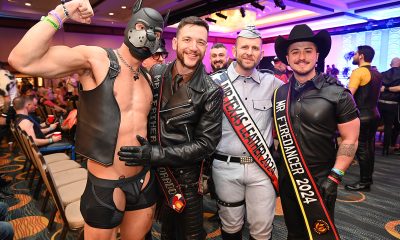Arts & Entertainment
Social Agenda
friday, jan. 15
Mid-Atlantic Leather Weekend, one of the largest gay leather gatherings in the world, is this weekend in Washington at the Washington Plaza Hotel. The event is sold out but some spillover hotels have rooms available and some events are open to the public. Visit leatherweekend.com for more information.
Gay District meets tonight. The group was formerly known as the Twenties Group but has expanded its age range for gay, bi, trans and questioning men from 18 to 35. The group meets for weekly discussion from 8:30 to 9:30 every Friday at St. Margaret’s Church located at 1830 Connecticut Ave. Members dine afterwards then go dancing. The group is changing its contact information but for now, those interested can visit the group on Facebook under the name “GD: Gay District.”
The D.C. Cowboys are having a new event starting tonight called Brodeo at Remington’s. It will feature country, western, disco and club music, performances, giveaways, Jell-O shots, an auction and the Cowboys. Proceeds benefit the group, which uses funds to facilitate its ability to provide free entertainment for HIV and AIDS charity groups. For more information, visit dccowboys.org. Remington’s is at 639 Pennsylvania Ave., S.E.
saturday, jan. 16
A new gay-owned gallery called Industry Gallery opens tonight from 6 to 8 p.m. with “Round the Corner,” the debut solo U.S. exhibition of Jerusalem-born artist Shlomo Harush. Visit industrygallerydc.com for more information. The gallery will be open Wednesdays through Saturdays from 11 a.m. to 5 p.m.
Town has two events tonight. DJ Brett Henrichsen spins upstairs (Town’s regular DJ Wess is downstairs). And monthly party “WTF?” is also tonight with a special Mexican installment. Doors open at 10 p.m. Town is located at 2009 Eighth Street, N.W. Visit towndc.com for more information.
Blowoff, a monthly party featuring gay DJs/remixers Bob Mould and Rich Morel, is tonight at the 9:30 club, located at 815 V Street, N.W. starting at 11:30 p.m. Visit blowoff.us for more information.
sunday, jan. 17
Reaction, the closing night party for Mid-Atlantic Leather Weekend, is tonight from 10 p.m. to 5 a.m. at the 9:30 club, located at 815 V Street, N.W., with music by DJ David LaSalle and entertainment by German retro singer Myke Lowe. Tickets are $35 in advance or $45 at the door. They’re available at the Leather Rack or ticketfly.com.
monday, jan. 18
Metropolitan Community Church of Washington, the District’s largest mostly gay church, has an HIV positive support group for people of faith every Monday at the church. For more information, contact Matt Senger at 202-546-2159 or e-mail him at [email protected]. MCC-DC is located at 474 Ridge Street, N.W. Visit mccdc.com for more information about the church.
Freddie’s Beach Bar, located at 555 S. 23rd Street in Crystal City, Va., has disco trivia every Monday at 8 p.m.
tuesday, jan. 19
A remembrance event for Martin Luther King Jr. is being held tonight by the GLBT Arts Consortium from 7 to 9 p.m. at Capitol Hill Presbyterian Church at 4th and Independence Ave., S.E. near the Eastern Market and Capitol South Metro stations. The event is free and open to the public.
D.C.’s HIV Working Group assembles safer sex kits with its “packing parties” every Tuesday at EFN Lounge. Those who volunteer their time get drink discounts. The events are held from 7 to 10:30 p.m. at Motley Bar, located above EFN, which is at 1318 9th St., N.W. Visit fighthivindc.com for more information.
Poz, a bar night for HIV-positive men and men open to dating HIV-positive men regardless of their own HIV status, is held every Tuesday night from 7 p.m. to midnight at Motley Bar, located above EFN Lounge at 1318 19th St., N.W. The event is organized by HIV-positive party promoter Jacob Pring. Visit the group’s Facebook page at facebook.com/pozdc for more information.
Hollaback, a social club and support group for trans people, presented by Alpha Drugs, is tonight at 1638 R St., N.W., Suite 260. To RSVP, call Dee Curry at 202-290-0324.
Cobalt has “Flashback,” a retro night, every Tuesday at 10 p.m. Cobalt is at the corner of 17th and R streets, N.W.
wednesday, jan. 20
The National Gay and Lesbian Task Force has weekly volunteer nights every Wednesday from 6 to 7:30 p.m. at its offices located at 1325 Massachusetts Ave., N.W., Suite 600. Volunteers fold and stuff letters for the gay rights organization. Pizza is provided. For more information, contact Ezra Towne at [email protected].
Ladies First night is tonight and every Wednesday at Fab Lounge, located at 1805 Connecticut Ave., N.W. For more information, visit myspace.com/ladiesfirst.
An HIV/AIDS support group, presented by Alpha Drugs, is tonight at 1638 R St., N.W., Suite 260. Dinner will be served but reservations are required. To RSVP, call 301-735-2805 or 301-674-8901.
The D.C. Center has career development for LGBT job seekers today from 3 to 4:30 p.m. Trained counselors will offer support for job searching, interviewing skills, resume writing, etc. The program has been adapted to meet the needs of the local gay community and the D.C. job market. The Center recently moved to its new location at 1804/1810 14th St., N.W., previous home of the Lesbian Services Program and Austin Center of Whitman-Walker Clinic. Visit thedccenter.org for more information.
thursday, jan. 21
D.C. Lambda Squares, a local gay square dancing group, meets every Thursday for square dancing. Those who’ve taken the group’s “Mainstream” and “Plus” classes dance on the first and third Thursdays. “Plus” and “Advanced” classes are on the second and fourth Thursdays. For more information about the group or to find out when beginner classes are available, visit dclambdasquares.org.
friday, jan. 22
A GaySpirits event is being held this weekend in Annandale, Va. It’s a spiritual retreat for gay men who’ve avoided religion because many faiths condemn them. GaySpirits creators say gay men have “unique spiritual giftedness.” The events will take place at Little River U.C.C., located at 8410 Little River Turnpike, tonight from 7 to 9:30 p.m. and on Saturday from 9 a.m. to 6:30 p.m. Cost is $70. For more information, visit gayspirits.com or call 301-580-2953.
saturday, jan. 23
Adventuring Outdoors Group, a gay hiking group, is joining the Chrysalis Arts and Culture Group, another local gay social outfit, for a trip to Gettysburg today. A moderate 6-mile hike is planned with some steep passages. Those interested should bring beverages, lunch, hiking shoes and about $12 for transportation fees. The groups will meet at 9 a.m. at the Grosvenor-Strathmore Metro Station. For more information, contact Craig at 202-462-0535 or [email protected].
D.C. Lambda Squares, a local gay square dancing outfit, has a community dance today with guest caller Jeremy Butler from Virginia Beach. The dance will be held from 7 to 10 p.m. at Sligo Middle School in Silver Spring, Md. Cost is $10. For more information about this or other club affairs, visit dclambdasquares.org.
Several local gay social groups are joining D.C. Icebreakers, a local gay ice skating group, tonight for a large social event at the Kettler Capitals Iceplex in Ballston. Skating will run from 8 to 9 p.m. with a social to follow at Bailey’s Pub and Grill. Other groups slated to join the Icebreakers are Zoom Urban Lesbian Excursions, NOVA Gay & Lesbian Professionals, D.C. Lesbian Singles, Burgundy Crescent Volunteers, NOVA Dynamic Lesbian Singles, the Mixed Ladies Arlington Pool League and Social Cheverly. For more information, visit dcicebreakers.org.
Books
Love or fear flying you’ll devour ‘Why Fly’
New book chronicles a lifetime obsession with aircraft

‘Why Fly’
By Caroline Paul
c. 2026, Bloomsbury
$27.99/256 pages
Tray table folded up.
Check. Your seat is in the upright position, the airflow above your head is just the way you like it, and you’re ready to go. The flight crew is making final preparations. The lights are off and the plane is backing up. All you need now is “Why Fly” by Caroline Paul, and buckle up.

When she was very young, Paul was “obsessed” with tales of adventure, devouring accounts written by men of their derring-do. The only female adventure-seeker she knew about then was Amelia Earhart; later, she learned of other adventuresome women, including aviatrix Bessie Coleman, and Paul was transfixed.
Time passed; Paul grew up to create a life of adventure all her own.
Then, the year her marriage started to fracture, she switched her obsession from general exploits to flight.
Specifically, Paul loves experimental aircraft, some of which, like her “trike,” can be made from a kit at home. Others, like Woodstock, her beloved yellow gyrocopter, are major purchases that operate under different FAA rules. All flying has rules, she says, even if it seems like it should be as freewheeling as the birds it mimics.
She loves the pre-flight checklist, which is pure anticipation as well as a series of safety measures; if only a relationship had the same ritual. Paul loves her hangar, as a place of comfort and for flight in all senses of the word. She enjoys thinking about historic tales of flying, going back before the Wright Brothers, and including a man who went aloft on a lawn chair via helium-filled weather balloons.
The mere idea that she can fly any time is like a gift to Paul.
She knows a lot of people are terrified of flying, but it’s near totally safe: generally, there’s a one in almost 14 million chance of perishing in a commercial airline disaster – although, to Paul’s embarrassment and her dismay, it’s possible that both the smallest planes and the grandest loves might crash.
If you’re a fan of flying, you know what to do here. If you fear it, pry your fingernails off the armrests, take a deep breath, and head to the shelves. “Why Fly” might help you change your mind.
It’s not just that author Caroline Paul enjoys being airborne, and she tells you. It’s not that she’s honest in her explanations of being in love and being aloft. It’s the meditative aura you’ll get as you’re reading this book that makes it so appealing, despite the sometimes technical information that may flummox you between the Zen-ness. It’s not overwhelming; it mixes well with the history Paul includes, biographies, the science, heartbreak, and exciting tales of adventure and risk, but it’s there. Readers and romantics who love the outdoors, can’t resist a good mountain, and crave activity won’t mind it, though, not at all.
If you own a plane – or want to – you’ll want this book, too. It’s a great waiting-at-the-airport tale, or a tuck-in-your-suitcase-for-later read. Find “Why Fly” and you’ll see that it’s an upright kind of book.
The Blade may receive commissions from qualifying purchases made via this post.
Theater
Out actor Kevin Cahoon on starring role in ‘Chez Joey’
Arena production adapted from Broadway classic ‘Pal Joey’

‘Chez Joey’
Through March 15
Arena Stage
1101 Sixth St., S.W.
Tickets start at $93
Arenastage.org
As Melvin Snyder in the new musical “Chez Joey,” out actor Kevin Cahoon plays a showbiz society columnist who goes by the name Mrs. Knickerbocker. He functions as a sort of liaison between café society and Chicago’s Black jazz scene circa 1940s. It’s a fun part replete with varied insights, music, and dance.
“Chez Joey” is adapted from the Broadway classic “Pal Joey” by Richard Rodgers and Lorenz Hart. It’s inspired by John O’Hara’s stories based on the exploits of a small-time nightclub singer published in The New Yorker.
A warm and humorous man, Cahoon loves his work. At just six, he began his career as a rodeo clown in Houston. He won the Star Search teen division at 13 singing songs like “Some People” from “Gypsy.” He studied theater at New York University and soon after graduating set to work playing sidekicks and comedic roles.
Over the years, Cahoon has played numerous queer parts in stage productions including “Hedwig and the Angry Inch,” “La Cage aux Folles,” “Rocky Horror” as well as Peanut in “Shucked,” and George the keyboardist in “The Wedding Singer,” “a sort of unicorn of its time,” says Cahoon.
Co-directed by Tony Goldwyn and the great Savion Glover, “Chez Joey” is a terrific and fun show filled with loads of talent. Its relevant new book is by Richard Lagravenese.
On a recent Monday off from work, Cahoon shared some thoughts on past and current happenings.
WASHINGTON BLADE: Is there a through line from Kevin, the six-year-old rodeo clown, to who we see now at Arena Stage?
KEVIN CAHOON: Anytime I want to land a joke in a theater piece it goes back to that rodeo clown. It doesn’t matter if it’s Arena’s intimate Kreeger Theatre or the big rodeo at the huge Houston Astrodome.
I was in the middle stadium and there was an announcer — a scene partner really. And we were doing a back and forth in hopes of getting laughs. At that young age I was trying to understand what it takes to get laughs. It’s all about timing. Every line.
BLADE: Originally, your part in “Chez Joey” Melvin was Melba who sings “Zip,” a clever woman reporter’s song. It was sort of a star feature, where they could just pop in a star in the run of “Pal Joey.”
CAHOON: That’s right. And in former versions it was played by Martha Plimpton and before her Elaine Stritch. For “Chez Joey,” we switched gender and storyline.
We attempted to do “Zip” up until two days before we had an audience at Arena. Unexpectedly they cut “Zip” and replaced it with a fun number called “I Like to Recognize the Tune,” a song more connected to the story.
BLADE: Wow. You must be a quick study.
CAHOON: Well, we’re working with a great band.
BLADE: You’ve played a lot of queer parts. Any thoughts on queer representation?
CAHOON: Oh yes, definitely. And I’ve been very lucky that I’ve had the chance to portray these characters and introduce them to the rest of the world. I feel honored.
After originating Edna, the hyena on Broadway in “The Lion King,” I left that to do “Hedwig and the Angry Inch” as standby for John Cameron Mitchell, doing one show a week for him.
Everyone thought I was crazy to leave the biggest musical of our time with a personal contract and getting paid more money that I’d ever made to get $400 a week at the downtown Jane Street Theatre in a dicey neighborhood.
At the time, I really felt like I was with cool kids. I guess I was. And I never regretted it.
BLADE: When you play new parts, do you create new backstories for the role?
CAHOON: Every single time! For Melvin, I suggested a line about chorus boys on Lakeshore Drive.
BLADE: What’s up next for Kevin Cahoon?
CAHOON: I’m about to do the New York Theatre Workshop Gala; I’ve been doing it for nine years in a row. It’s a huge job. I’ll also be producing the “Cats: The Jellicle Ball” opening on Broadway this spring; it’s a queer-centric uptown vogue ball with gay actor André de Shields reprising his role as “Old Deuteronomy.”
BLADE: There’s a huge amount of talent onstage in “Chez Joey.”
CAHOON: There is. I’m sharing a dressing room with Myles Frost who plays Joey. He won accolades for playing Michael Jackson on Broadway. We’ve become great friends. He’s a miracle to watch on stage. And Awa [Sal Secka], a D.C. local, is great. Every night the audience falls head over heels for her. When this show goes to New York, Awa will, no doubt, be a giant star.
BLADE: Do you think “Chez Joey” might be Broadway bound?
CAHOON: I have a good feeling it is. I’ve done shows out of town that have high hopes and pedigree, but don’t necessarily make it. “Chez Joey” is a small production, it’s funny, and audiences seem to love it.

The Capital Pride Alliance held the annual Pride Reveal event at The Schuyler at The Hamilton Hotel on Thursday, Feb. 26. The theme for this year’s Capital Pride was announced: “Exist. Resist. Have the audacity!”
(Washington Blade photos by Michael Key)























-

 India4 days ago
India4 days agoActivists push for better counting of transgender Indians in 2026 Census
-

 Advice4 days ago
Advice4 days agoDry January has isolated me from my friends
-

 District of Columbia4 days ago
District of Columbia4 days agoCapital Pride reveals 2026 theme
-

 National4 days ago
National4 days agoAfter layoffs at Advocate, parent company acquires ‘Them’ from Conde Nast




















